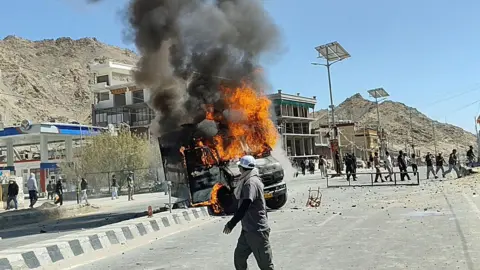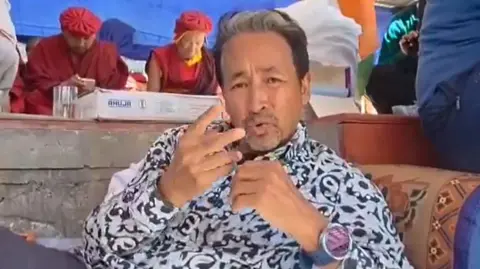Abhishek DeyBBC News, Delhi
 Reuters
ReutersIndian security forces have imposed a curfew in Leh, the capital of the Himalayan region of Ladakh, after at least four people were killed in violent clashes between police and protesters demanding statehood for the federal territory.
Dozens were also injured and an office of India’s ruling Bharatiya Janata Party (BJP) was set on fire in the unrest on Wednesday.
The government blamed activist Sonam Wangchuk, who’s been leading protests, of fomenting violence, a claim he denies.
A mountainous desert with a Muslim-Buddhist population, Ladkah lost its semi-autonomy in 2019 when the BJP government split it from the former Indian-administered state of Jammu and Kashmir, imposing direct rule on both.
The Leh region – where the violence broke out – is sandwiched between India, China and Pakistan. It is dominated by the Buddhist community, who for decades have demanded a separate region for its people. Meanwhile, the Muslim-majority Kargil district wants to be integrated with Indian-administered Kashmir.
Since 2019, both communities have joined together in demanding the restoration of statehood, along with greater autonomy which would give them job quotas.
It’s not clear what sparked Wednesday’s violence – protests have been taking place intermittently in the region for months.
In a late night statement, India’s federal home ministry blamed Mr Wangchuk for the unrest, alleging he had incited the mob by making provocative statements.
“He [Mr Wangchuk] continued with the hunger strike and misleading the people through provocative mention of Arab Spring-style protest and references to Gen-Z protests in Nepal.”
It said that protesters had attacked the BJP’s local office, set fire to the building and torched a police vehicle, injuring at least 30 police personnel.
“In self-defence, police had to resort to firing in which unfortunately some casualties are reported,” the statement added.
Mr Wangchuk called off a hunger strike he had been on since 12 September and appealed for calm, saying violence “only damages our cause”.
He denied having any role in the violence and said that growing frustration among young people is what had driven them onto the streets, with many of them being unemployed for years.
 Sonam Wangchuk
Sonam WangchukA well-known local activist and engineer who gained national attention for his work on education and climate change, Mr Wangchuk has been at the forefront of the protests demanding statehood for Ladkah.
He and other activists argue that since the change in Ladakh’s status, promises that residents would get more power in local politics have not been met.
Many fear that losing its former special status has left the region vulnerable to outside economic interests and diluted local control over culture, land and resources.
The federal government, however, denies this saying it has held talks with local leaders since 2023 and the dialogue process had yielded “phenomenal results”.
According to the government, it has been actively engaged with Mr Wangchuk and other activists on their demands, but “certain politically-motivated individuals were not happy with the progress” in the talks.
On Wednesday, Ladakh’s Lieutenant Governor Kavinder Gupta, who is the federally appointed officer in charge of the region, said that an investigation into the violence had been initiated.
“For the past two days, attempts have been made to incite people, and the protest held here was compared to those held in Bangladesh and Nepal. This smells of a conspiracy,” he said.
Another round of meetings between protesters and officials is set to take place on Thursday and Friday.
A committee set up by the federal government is also likely to meet leaders from the region on 6 October.
Follow BBC News India on Instagram, YouTube, Twitter and Facebook.

